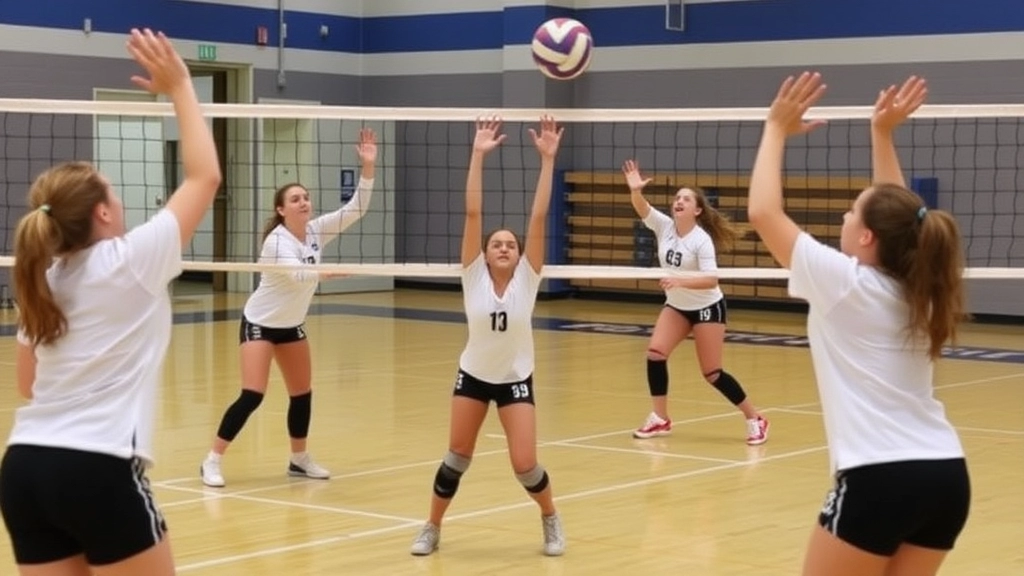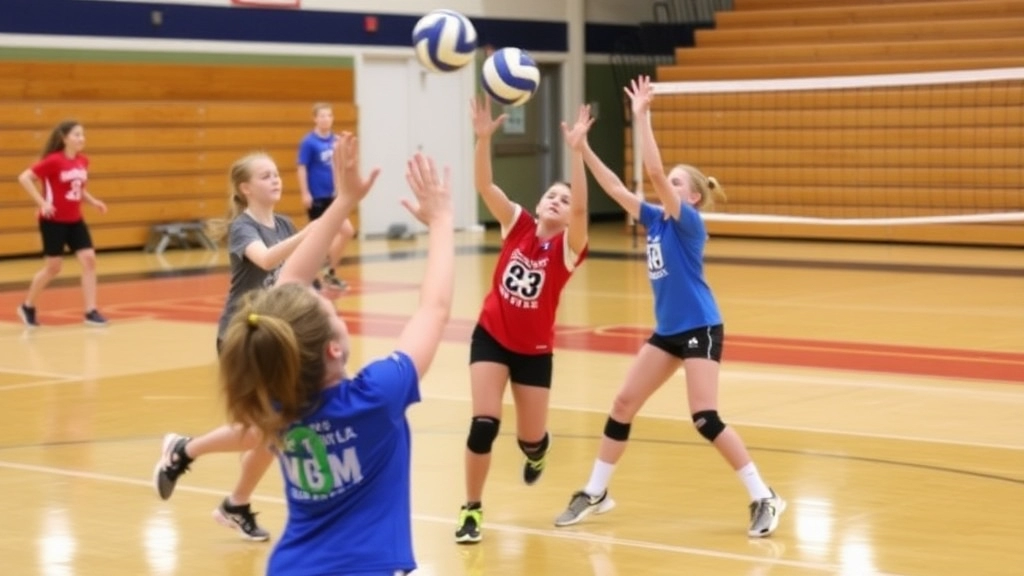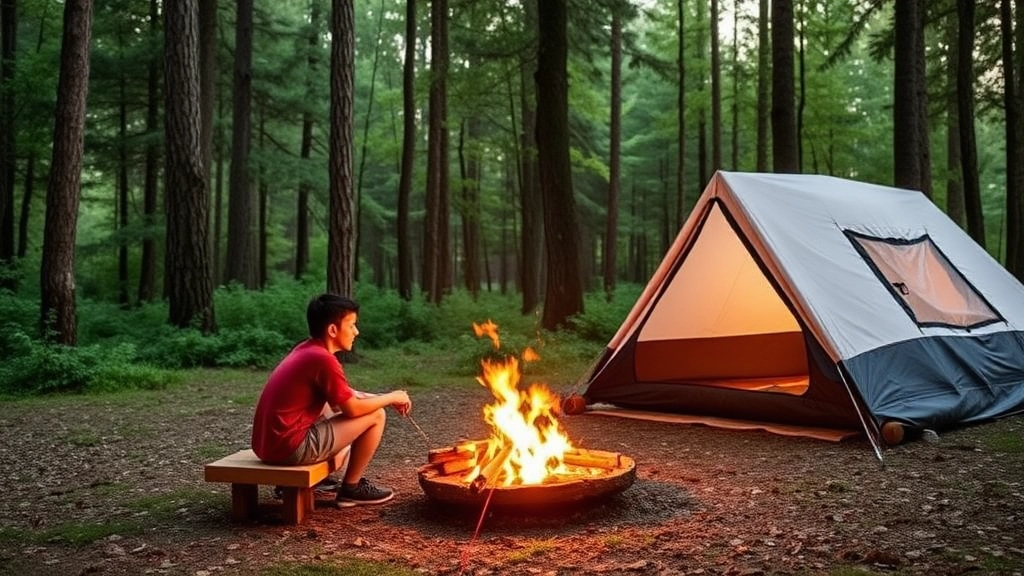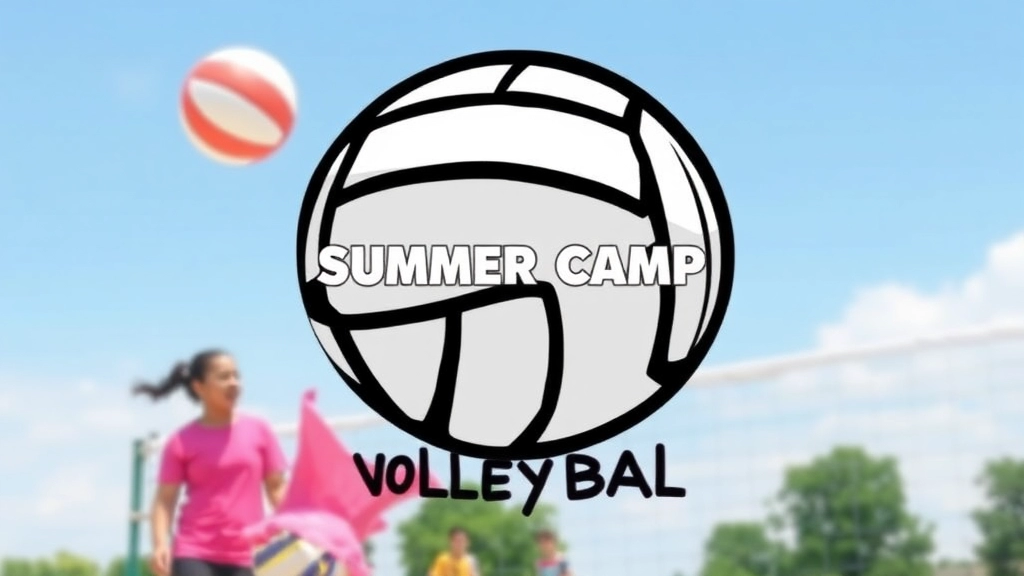Diving into Summer Camp Volleyball
Diving into the world of summer camp volleyball can be both exciting and overwhelming. This article guides you through choosing the right program, honing essential skills, and understanding the myriad benefits these camps offer. Whether you’re a beginner or a seasoned player, there’s something here for everyone.
What to Expect
From top camps for various age groups to packing essentials and expert tips, we’ve got you covered. Safety measures and FAQs ensure you’re well-prepared for an enriching experience. Ready to elevate your game and create unforgettable memories? Let’s get started!
Choosing the Right Summer Camp Volleyball Program
Alright, let’s get real. Choosing the right summer camp volleyball program can feel like a daunting task. You’ve got a ton of options, and you want to make sure you pick the one that’s going to give you the best bang for your buck. So, how do you do it? Let’s break it down.
What Are Your Goals?
What’s your endgame? Are you looking to sharpen your skills for the upcoming school season? Or maybe you’re just in it for some fun in the sun while learning a new sport? Knowing your goals will help you narrow down your choices.
Skill Level Matters
- Beginner Camps: If you’re new to volleyball, look for camps that focus on the basics â serving, passing, setting, and spiking.
- Intermediate Camps: Already got the basics down? Intermediate camps will help you refine those skills and introduce more advanced techniques.
- Advanced Camps: For the seasoned players, advanced camps offer intense drills, strategy sessions, and competitive play.
Camp Duration and Schedule
How much time do you have? Some camps run for a week, while others can last the entire summer. Make sure the camp fits into your schedule. If you’ve got other commitments, a shorter camp might be the way to go.
Coach Credentials
The quality of coaching can make or break your experience. Look for camps with experienced coaches who have a background in competitive volleyball. Former professional players or college coaches? Even better.
Facilities and Equipment
You don’t want to be stuck playing on a subpar court with outdated equipment. Check out the camp’s facilities. Do they have indoor and outdoor courts? What about gym access and training equipment?
Camper Reviews
Word of mouth is powerful. Read reviews and testimonials from previous campers. Did they improve their skills? Was the camp well-organized? Reviews can give you a good sense of what to expect.
Cost vs. Value
Summer camps can be pricey, but don’t just go for the cheapest option. Consider what you’re getting for your money. Sometimes paying a bit more means access to better facilities, top-notch coaching, and a more enriching experience.
Location, Location, Location
Is the camp close to home, or will you need to travel? If it’s far away, factor in travel costs and logistics. Sometimes the best camp might be a bit of a drive, but if it’s worth it, don’t let distance hold you back.
Safety Protocols
In today’s world, safety is a big deal. Make sure the camp has strict safety measures in place, including COVID-19 protocols, first aid availability, and trained staff to handle emergencies.
Example: My First Volleyball Camp Experience
When I first started, I chose a camp that was all about fun and basic skills. I wasn’t looking to go pro, just wanted to get a feel for the game. The coaches were super friendly, the drills were easy to follow, and I made some great friends. That experience laid the foundation for my love of volleyball and helped me decide to pursue it more seriously later on.
If you’re looking to maximize your experience, consider checking out our guide on maximizing your basketball summer camp experience. Also, explore some top volleyball summer camps in the USA to find the perfect fit for your needs.
Key Skills Developed in Volleyball Camps

Alright, let’s dive in.
You’re thinking about signing up for a volleyball summer camp, but you’re wondering: “What skills will I actually learn?”
Great question.
Keyword alert: Volleyball camps are not just about hitting the ball over the net. They’re about developing a range of skills that’ll make you a better player and teammate.
Core Skills You’ll Master
- Serving
You’ll learn different serving techniques—float serve, jump serve, and more.
Consistent practice helps you nail down accuracy and power. - Passing
Perfecting your bump and set.
Camps focus on getting your body position right and improving hand-eye coordination. - Setting
Not just for setters.
Everyone gets to practice setting to ensure smooth plays. - Hitting/Spiking
Timing, approach, and follow-through.
You’ll get plenty of reps to master that killer spike. - Blocking
Learn to read the hitter and time your jumps.
Blocking drills help you become a wall at the net. - Defensive Skills
Digging, diving, and rolling.
Camps train you to react quickly and get those impossible saves.
Tactical Awareness
- Game Strategy
Understanding formations, rotations, and when to switch tactics.
You’ll get to play in different scenarios to see what works best. - Court Awareness
Knowing where you and your teammates are at all times.
Helps in making quick decisions and avoiding collisions.
Mental Toughness
- Focus and Concentration
Drills designed to keep your head in the game, even when you’re tired. - Teamwork and Communication
Camps stress the importance of talking on the court.
You’ll practice calling the ball and supporting your teammates.
Physical Fitness
- Strength and Conditioning
Volleyball camps include workouts to build your core, legs, and upper body.
Think plyometrics, sprints, and agility drills. - Endurance
Long sessions mean you’ll build stamina.
By the end of camp, you’ll be less likely to tire out in a match.
Real Stories
I remember this one camp where a shy player, let’s call her Sarah, barely spoke on the first day.
By the end of the week, she was calling the shots and leading her team.
That’s the kind of transformation you can expect.
Wrap-Up
In short, volleyball camps are a goldmine for skill development.
From technical abilities to mental toughness, you’ll come out a better player.
So, if you’re serious about upping your game, a volleyball camp is the way to go.
Benefits of Attending a Volleyball Summer Camp
Ever wondered if a volleyball summer camp is worth your time? Let’s break it down. The benefits are massive and can seriously up your game. Whether you’re a newbie or a seasoned player, there’s something for everyone. Here’s why you should consider it:
Skill Enhancement
First off, let’s talk skills. At a volleyball summer camp, you’re not just playing around; you’re getting serious training. Here’s what you can expect:
- Fundamental Skills: Passing, setting, spiking, and serving. You get to drill these basics until they’re second nature.
- Advanced Techniques: For the more experienced players, camps offer advanced strategies and techniques. Think jump serves, quick sets, and defensive formations.
- Position-Specific Training: Whether you’re a setter, hitter, or libero, there’s focused training to sharpen your role-specific skills.
Physical Conditioning
Volleyball isn’t just about skill; it’s also about being in top physical shape. Camps include:
- Strength and Conditioning: Tailored workouts to boost your strength, agility, and endurance.
- Nutrition Guidance: Learn what to eat to fuel your body properly for peak performance.
- Injury Prevention: Techniques and exercises to keep you injury-free throughout the season.
Teamwork and Communication
Volleyball is a team sport, and camps focus heavily on:
- Team Drills: Exercises that improve team coordination and chemistry.
- Communication Skills: Learn how to effectively communicate on the court to avoid confusion and errors.
- Leadership Development: Camps often include sessions on leadership skills, crucial for team captains and aspiring leaders.
Personal Growth
It’s not all about volleyball. These camps also offer:
- Confidence Building: As you improve, your confidence on and off the court will skyrocket.
- Discipline and Work Ethic: The structured environment teaches you the importance of discipline and a strong work ethic.
- Social Skills: Meet new friends who share your passion for volleyball. Networking with peers and coaches can open doors for future opportunities.
Real-Life Examples
Take Sarah, for instance. She was a decent high school player but wanted to step up her game. After attending a summer sports camp, she not only improved her skills but also got noticed by college scouts. Now, she’s playing at the collegiate level. Stories like Sarah’s are common, showing how these camps can be a game-changer.
If you’re interested in exploring more about camp experiences, check out our guide on summer camp culture for a deeper dive into the traditions and activities that make camps special.
Top Volleyball Camps for Different Age Groups

So, you’re thinking about sending your kid to a volleyball camp, or maybe you’re a young player eager to level up. But where do you start? How do you choose the right camp for your age group? Let’s break it down.
Why Age Matters
Different age groups have different needs. A camp for a 10-year-old won’t suit a 17-year-old. Simple, right? You want a camp that matches the skill level and developmental stage of the player.
Camps for Kids (Ages 8-12)
At this age, it’s all about fun and basics. Look for camps that focus on:
- Fundamentals: Passing, setting, and serving.
- Team Play: Learning to work with others.
- Confidence Building: Encouraging a love for the game.
Example Camp: Junior Spikers
Imagine a place where kids learn through play. Junior Spikers offers just that.
Camps for Teens (Ages 13-17)
Now, we’re talking more serious stuff. Teens need to refine skills and maybe even think about college recruitment. Key focuses include:
- Advanced Techniques: Blocking, attacking, and strategic play.
- Fitness Training: Building strength and agility.
- Game IQ: Understanding tactics and strategies.
Example Camp: Elite Volleyball Academy
Picture a camp where teens train like pros. Elite Volleyball Academy pushes players to their limits.
Camps for Adults (18+)
Yes, adults can join in the fun too! Whether you’re a beginner or looking to compete, there are camps for you.
- Skill Development: Tailored to your level.
- Competitive Play: Engage in tournaments.
- Networking: Meet other volleyball enthusiasts.
Example Camp: Volley for Life
Think about a camp that combines learning with socialising—Volley for Life does just that.
Choosing the Right Camp
Consider these factors:
- Location: Is it convenient?
- Cost: Does it fit your budget?
- Duration: How long is the camp?
- Reputation: Check reviews and testimonials.
What to Pack for a Volleyball Summer Camp
Alright, so you’re all set to hit up a volleyball summer camp, but now you’re staring at your suitcase like it’s a puzzle. What do you actually need to pack? Trust me, I’ve been there. Let’s break it down so you can focus on spiking balls instead of stressing out.
Essential Gear
First things first, you need the basics. Here’s your go-to list:
- Volleyball Shoes: These aren’t your regular trainers. You need something with good grip and ankle support.
- Knee Pads: Save those knees! Trust me, you’ll thank me later.
- Athletic Socks: Bring a few pairs. Sweaty feet are not fun.
- Comfortable Training Clothes: Think breathable, moisture-wicking fabrics. You’re going to sweatâa lot.
- Volleyballs: Some camps provide them, but it’s always good to have your own for extra practice.
Personal Items
You can’t forget the stuff that keeps you human:
- Water Bottle: Hydration is key. A reusable one is best.
- Towels: One for showering, one for wiping off sweat.
- Toiletries: Shampoo, conditioner, soap, toothbrush, toothpaste. You know the drill.
- Sunscreen: Even if you’re indoors most of the time, you’ll likely have some outdoor sessions.
- Snacks: Think energy bars, nuts, and fruits. Keep it healthy but tasty.
Optional but Handy
These aren’t must-haves, but they’ll make your life easier:
- Compression Gear: Helps with muscle recovery and support.
- Extra Laces: You never know when a lace might snap.
- Notebook and Pen: Jot down tips, drills, and strategies.
- Portable Charger: Because your phone’s not going to charge itself.
Packing Tips
- Roll, Don’t Fold: Rolling your clothes saves space and keeps them less wrinkled.
- Ziplock Bags: Use these for toiletries to avoid spills.
- Label Everything: Especially if you’re in a shared dorm. Trust me, things go missing.
Real Talk: What I Wish I Knew
When I first went to a volleyball camp, I totally underestimated the importance of having a good pair of shoes and enough socks. I ended up with blisters that made me sit out for a day. Also, packing a small first aid kit with band-aids and antiseptic can be a lifesaver.
If you’re still unsure about what to pack, you might find our summer camp packing list helpful. And for more tips on how to stay safe and prepared, check out our guide on summer camp cabin safety and design tips.
Expert Tips for Maximizing Camp Experience

So, you’ve signed up for a summer volleyball camp. Now what?
How do you make sure you get the most out of it?
Here are some expert tips to make your camp experience unforgettable.
Set Clear Goals
Why are you attending the camp?
- Improve your serve?
- Master your spike?
Write down your goals.
Keep them specific and achievable.
Stay Open-Minded
You’ll meet coaches and players with different techniques.
Listen and learn.
Even if it feels weird at first, give it a shot.
Network
You’re not just there to play volleyball.
Make friends.
Talk to coaches.
These connections could help you in future tournaments or even college applications.
Hydrate and Eat Well
You’ll be sweating buckets.
Drink water.
Eat balanced meals.
Your performance depends on your fuel.
Ask Questions
If you don’t understand a drill or technique, ask.
Coaches appreciate engaged players.
It shows you’re serious about improving.
Take Notes
Bring a notebook.
Jot down drills, tips, and feedback.
Review them later to reinforce your learning.
Rest and Recover
Don’t underestimate the power of rest.
Sleep well.
Stretch.
Your body needs to recover to perform at its best.
Have Fun
Yes, you’re there to get better.
But don’t forget to enjoy yourself.
Volleyball is a game, after all.
Real Stories
I remember a player named Jake.
He came to camp with a decent serve but wanted to perfect it.
He asked questions, took notes, and practised relentlessly.
By the end of camp, his serve was a game-changer.
Final Thoughts
Maximizing your camp experience isn’t rocket science.
Set goals, stay open-minded, network, hydrate, ask questions, take notes, rest, and have fun.
Follow these tips, and you’ll leave camp not just as a better player, but also with memories and friendships that last a lifetime.
Ready to crush it at camp?
Let’s go!
For more details on what to pack or the top camps for different age groups, check out our other sections.
You’ll find everything you need to make your camp experience the best it can be.
Safety Measures and Protocols in Volleyball Camps
Alright, let’s talk safety. If you’re sending your kid to a volleyball summer camp, you’re probably wondering, “How safe is it?” and “What precautions are they taking?” These are real concerns, and trust me, they’re valid. So, let’s dive into the nitty-gritty of safety measures and protocols in volleyball camps.
Why Safety Measures Matter
First off, safety isn’t just a buzzword; it’s the backbone of any good camp experience. Injuries, illnesses, and other mishaps can turn a fun summer into a nightmare. That’s why camps go above and beyond to ensure every camper is safe and sound.
Comprehensive Safety Protocols
Here’s a breakdown of the key safety measures you should expect from a top-notch volleyball camp:
- Qualified Staff:
- Coaches and trainers should be certified and experienced.
- Medical personnel should be on-site or easily accessible.
- Health Screenings:
- Regular health checks to catch any potential issues early.
- COVID-19 protocols, including testing and social distancing where necessary.
- Proper Equipment:
- Well-maintained nets, balls, and protective gear.
- Regular inspections to ensure everything is in top condition.
- Emergency Procedures:
- Clear plans for handling injuries or emergencies.
- Staff trained in first aid and CPR.
Real-Life Example: Sarah’s Story
Let me share a quick story. Sarah, a 13-year-old volleyball enthusiast, attended a summer camp last year. During a match, she twisted her ankle. Thanks to the camp’s quick response and well-trained staff, she received immediate care and was back on the court in no time. This is what you wantâa camp that handles situations efficiently and effectively.
Daily Safety Routines
Safety isn’t a one-time thing; it’s a daily routine. Here’s what that looks like:
- Warm-Ups and Cool-Downs: Essential to prevent injuries.
- Hydration Stations: Keeping kids hydrated, especially in the summer heat.
- Buddy System: Ensures no one is left alone, reducing risks.
Parental Peace of Mind
As a parent, you can take a few steps to ensure your child’s safety too:
- Research: Look into the camp’s safety records and reviews.
- Communication: Stay in touch with camp staff and your child.
- Packing Essentials: Make sure your child has all necessary medications and a first-aid kit.
For more tips on choosing the right volleyball camp, check out our section on Top Volleyball Summer Camps in the USA or dive into Summer Camp Culture: Traditions, Activities, and Growth to get the most out of your camp journey.
Frequently Asked Questions About Volleyball Camps
Got questions about volleyball summer camps?
You’re not alone.
Let’s dive into the most common queries and concerns.
1. What age groups do volleyball camps cater to?
Most camps are designed for various age groups, from young beginners to advanced teenage players. Some camps even offer sessions for adults.
2. How do I know if a camp is right for my skill level?
Camps usually provide skill level descriptions. Look for camps that match your current abilities.
3. What’s the typical daily schedule like?
Expect a mix of:
- Drills
- Games
- Strategy sessions
- Team-building activities
4. Are coaches experienced?
Most camps hire seasoned coaches. Some even feature former professional players.
5. What should I pack for a volleyball camp?
Essentials include:
- Comfortable sportswear
- Volleyball shoes
- Knee pads
- Water bottle
- Sunscreen
For a complete list, check out our detailed guide on What to Pack for a Volleyball Summer Camp.
6. Will I get personal feedback?
Yes, most camps offer individual evaluations. This helps you understand your strengths and areas for improvement.
7. Are there any safety measures in place?
Absolutely. Camps follow strict safety protocols. For more details, read our section on Safety Measures and Protocols in Volleyball Camps.
8. Can I make friends at camp?
Definitely. Camps are a great place to meet like-minded people. You’ll bond over shared experiences and challenges.
9. How can I maximise my camp experience?
- Stay open to learning
- Ask questions
- Practise outside of sessions
For more tips, visit Expert Tips for Maximising Camp Experience.
10. What if I don’t enjoy the camp?
Most camps have a refund policy. Check the terms before you sign up.
Still have questions?
Feel free to reach out. We’re here to help you find the perfect volleyball camp experience.
FAQs About Summer Camp Volleyball
What skills can I expect to develop at a volleyball summer camp?
Volleyball summer camps focus on a wide range of skills including serving, passing, setting, hitting/spiking, blocking, and defensive skills. Additionally, camps emphasize tactical awareness, mental toughness, and physical fitness.
Are volleyball camps suitable for all age groups?
Yes, there are volleyball camps designed for different age groups, from kids (ages 8-12) to teens (ages 13-17), and even adults (18+). Each camp is tailored to meet the developmental needs and skill levels of its participants.
What should I look for when choosing a volleyball camp for my child?
Consider factors such as location, cost, duration, and reputation. It’s also important to ensure the camp focuses on the fundamentals for younger kids and more advanced techniques for teens.
How can I maximize my experience at a volleyball camp?
Set clear goals, stay open-minded, network with others, hydrate and eat well, ask questions, take notes, rest and recover, and most importantly, have fun.
What kind of physical fitness training is included in volleyball camps?
Volleyball camps often include strength and conditioning exercises, such as plyometrics, sprints, and agility drills, to build core, leg, and upper body strength. Endurance training is also a key component to help players build stamina.
Can adults attend volleyball camps?
Absolutely! There are volleyball camps specifically designed for adults, whether they’re beginners or looking to compete. These camps focus on skill development, competitive play, and networking opportunities.
What are some examples of specific volleyball camps for different age groups?
For kids, camps like Junior Spikers focus on fun and basic skills. For teens, Elite Volleyball Academy offers advanced training and fitness. Adults can join camps like Volley for Life, which combines learning with socializing.
Why is mental toughness important in volleyball, and how is it developed at camp?
Mental toughness is crucial for maintaining focus and concentration during games. Volleyball camps develop this through specific drills and by emphasizing teamwork and communication on the court.
What should I pack for a volleyball summer camp?
While the specific packing list may vary by camp, generally, you’ll need athletic wear, volleyball shoes, knee pads, a water bottle, snacks, sunscreen, and a notebook for jotting down tips and drills.
Are there any real success stories from volleyball camps?
Yes, many players experience significant growth. For example, a shy player named Sarah became a team leader by the end of her camp week, and a player named Jake perfected his serve through relentless practice and engagement.

